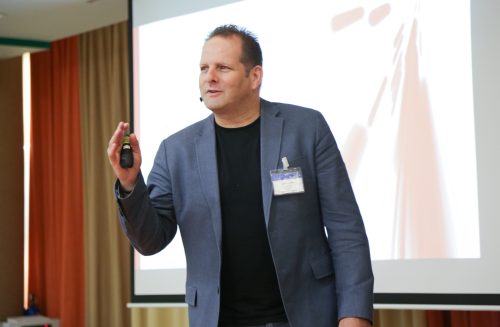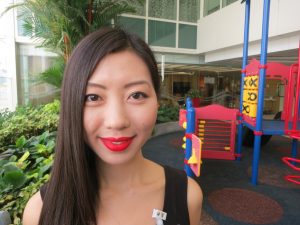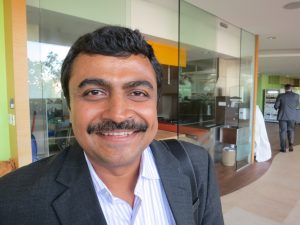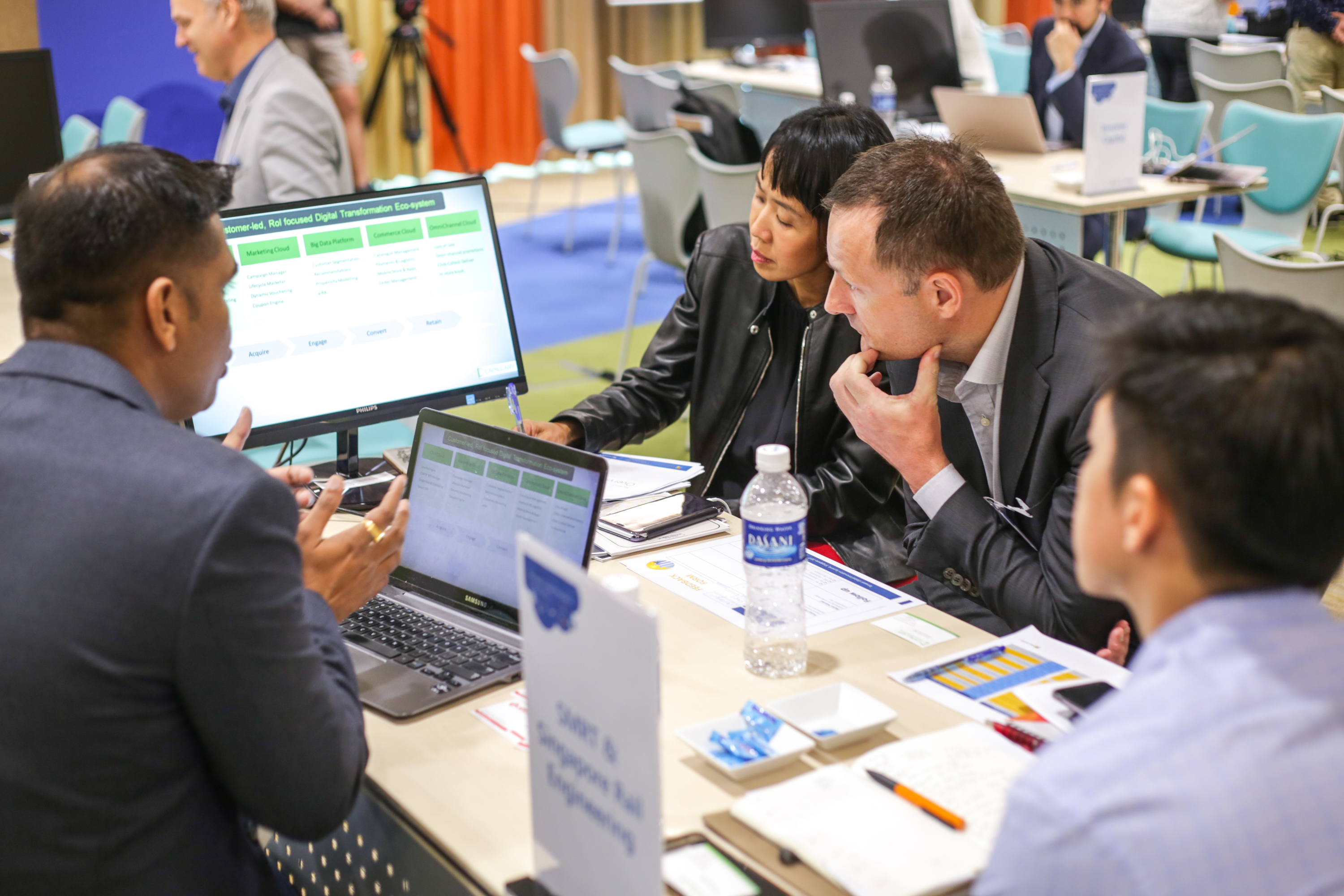A group of would-be “suitors” files into the meeting room. They pair off and sit down at designated tables face-to-face.
The clock starts and there are smiles and handshakes. Business cards are swapped, laptops opened, power point decks presented, spreadsheets explained and pitches made. The clock stops 20 minutes later. Everyone gets up, moves around and the process starts anew.
This is speed dating … for startups. They want to meet and work with top corporates who, in turn, want to catch the next big wave of innovation. Both sides have good reasons to get together. But, as with many relationships, a little push is sometimes needed to generate a spark. So, the organisers of the recent Temasek Global Innovation Summit in Singapore did some pro-active match-making.
“It is a fast way to get them connected and maybe to build relationships and make deals,” explained Zack Weisfeld, General Manager of Microsoft for Startups which co-organized the event with Temasek, a Singapore-headquartered investment company whose portfolio includes many of the city-state’s top firms as well as a wide range of corporates across the world.
The two sides formed a strategic alliance last year to better help startups develop their businesses and to give Temasek’s portfolio companies access to great innovation.

Those at the summit included 14 entrepreneurs who have graduated from the Microsoft for Startup’s Accelerator program which is aimed at transforming late-stage startups into major companies that will grow and compete in the 4th Industrial Revolution.
Weisfeld launched the Accelerator in 2012. Since then 647 startups – collectively backed by around US$3 billion in funding – have graduated from tailor-made programs run over four-to-six months in Bangalore, Shanghai, Beijing, London, Berlin, Seattle and Tel Aviv.
“Effectively, it is the number one corporate accelerator in the world,” he said. “Within five years it has built itself as one of the best places for entrepreneurs to go.”
With its reputation spreading, the chances of being accepted into the Microsoft program can be tougher than getting into an Ivy League business school in the United States, he said. “Some startups CEOs are wondering: Do they spend a lot of money and two years doing a Harvard MBA? Or do they go into our Accelerator program and be market-ready and building their business within a matter of months?”
Once in, participants get a lot. CEO coaching, specialised mentoring in high-level business and technology practices, Technology scaling based on Microsoft’s Azure cloud platform credits and even free co-working space if needed. Fledgling CEOs are coached in building and growing teams, recruiting and retaining talent, selling and working with big corporates, and much more. Business models are tested, examined refined and sometimes revamped.
Like an Ivy League degree, graduation from Microsoft Accelerator opens doors in the business world. “If you are a startup, one of the things you are looking for is someone to validate you,” Weisfeld said.
“Corporates get thousands of phones calls from unknown startups trying to sell their stuff. And, it is very hard for them to pick the winners, to pick the good ones. The fact that Microsoft is validating your solution or architecture or your go-to-market (proposition) is of huge value: both for our enterprise partners and the startups. Companies know you are good if you have graduated from our program.”
Operating on Azure is a key advantage for graduate startups as it aligns them with Microsoft’s massive global list of customers who are also on the platform.
“We serve as a place where corporates and startups come together to make business. And, it is all based on Azure,” he said. “You know about a ‘match made in heaven’. Well, we provide a ‘match made in Azure’.”
 One Microsoft for Startups Accelerator graduate at the Singapore summit was Tina Zhen, the co-founder of QT Parking – a Beijing-based startup that has data-based solutions for many of China’s traffic-choked cities. The program was “a phenomenal experience,” she said. “When we entered, we received great interest from government officials from all over China. Every other day we had someone in charge of a city, or even a province, coming into visit.
One Microsoft for Startups Accelerator graduate at the Singapore summit was Tina Zhen, the co-founder of QT Parking – a Beijing-based startup that has data-based solutions for many of China’s traffic-choked cities. The program was “a phenomenal experience,” she said. “When we entered, we received great interest from government officials from all over China. Every other day we had someone in charge of a city, or even a province, coming into visit.
“We had executives from global players, who are partnered with Microsoft, coming to visit and listen to our presentations and our solutions. We had national news journalists coming in to report on us.
“Most importantly we received great help in terms of technology, including from the Azure team. They helped us in polish our technology and to make it more ready for the market.”
QT Parking launched its first products in December with the guidance of a Microsoft sales team, one month before graduation. Now it is ready to go beyond China with new solutions, including using data from people who park their cars at shopping malls to better engage them as shoppers.
 Another summit participant was Vinay Nathan, the co-founder and CEO of Altizon, headquartered in the Indian tech-hub city of Pune. This startup is bringing the Internet of Things to the industrial sector by tapping data from machinery and plant to boost efficiencies and radically cut factory downtime.
Another summit participant was Vinay Nathan, the co-founder and CEO of Altizon, headquartered in the Indian tech-hub city of Pune. This startup is bringing the Internet of Things to the industrial sector by tapping data from machinery and plant to boost efficiencies and radically cut factory downtime.
His company migrated from another cloud to Azure and is now benefitting from its global nature.
“It has data centres all over the world,” he said. “This means we can geo-locate data. Azure helps us meet compliance and regulatory requirements in different countries.”
The Accelerator program had an even more important effect on his company. “It helped us reset our entire business model,” he recalled. “We sat down with the Microsoft team and looked at everything we wanted to do. It was very beneficial to us. It made us look inwards and fix things. That went a long way for us as we ramped up to the next level.”
With that, Altizon established a subsidiary in Orange County, California. He said Microsoft’s ability to link the company with potential clients could only help it expand in North America. “We are hoping it will take off in a big way,” he said. “Being part of the program has added a lot more credibility to our value proposition.”
 Rivi Varghese, is CEO of CustomerXPs. Based in Bangalore, India, it helps banks in six countries with anti-fraud solutions and other data-based products that help enhance customer experience to boost the high impact services in real time.
Rivi Varghese, is CEO of CustomerXPs. Based in Bangalore, India, it helps banks in six countries with anti-fraud solutions and other data-based products that help enhance customer experience to boost the high impact services in real time.
He said Azure as being essential in meeting rigorous banking regulations across countries. “Microsoft’s platform can always give me a strategy if I have a problem,” he said.
Being an Accelerator alumni means he can leverage Microsoft’s global business presence.
“It has foot soldiers all around the world who are connected to large enterprises,” he said. The financial sector tended to be conservative and so “banks usually go with the big boys. Because we are associated with Microsoft, we can now compete.”





